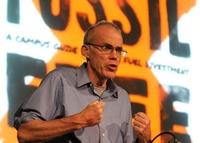In 1989, McKibben published The End of Nature,
a gorgeously written and galvanizing book about the true cost of global warming, the destruction of the ozone layer and other man-made ills—the loss of wild nature and with it the priceless aspect of our humanity that evolved to listen to and heed it. Now McKibben applies the same passion, scholarship and free-ranging thought to a subject that even committed environmentalists have avoided. Here he tackles what it means to be human. Reporting from the frontiers of genetic research, nanotechnology and robotics, he explores that subtle moral and spiritual boundary that he calls the "enough point." Presenting an overview of what is or may soon be possible, McKibben contends that there is no boundary to human ambition or desire or to what our very inventions may make possible. In an absorbing and horrifying montage of images, he depicts microscopic nanobots consuming the world and children born so genetically enhanced that they will never be able to believe that they reach for the stars as pianists or painters or long-distance runners because there is something unique in them that has a passion to try. Indeed, in the view of the most unbridled "technoutopians," the day of the robotically striving human is already here. What does set a human being apart from other beings, McKibben argues, is our capacity for restraint—and even for finding great meaning in restraint. "We need to do an unlikely thing: We need to survey the world we now inhabit and proclaim it good. Good enough." McKibben presents an uncompromising view, and an essential view. Readers will come away from his latest brilliantly provocative work shaking their heads at the possible future he portrays, yet understanding that becoming a pain-free, all-but-immortal, genetically enhanced semi-robot may be deeply unsatisfactory compared to being an ordinary man or woman who has faced his or her fear of death to relish what is. This is a brilliant book that deserves a wide readership. Author tour. (Apr.)


